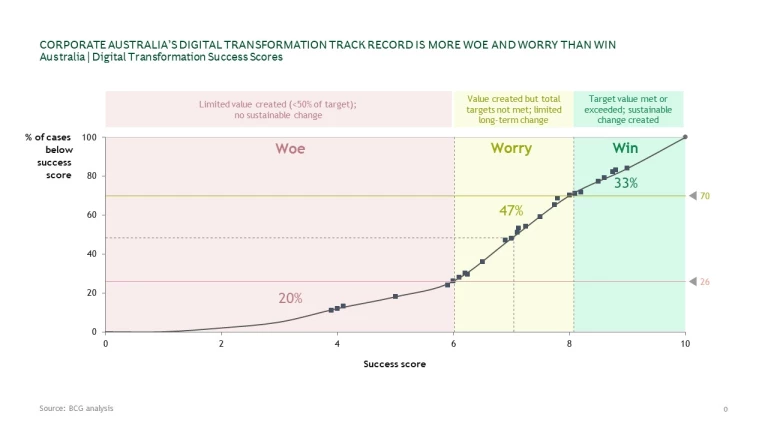Digital transformation was on corporate Australia’s agenda even before COVID-19, to improve customer experiences and drive productivity and innovation. But the pandemic has made digital performance an absolute imperative.
No one doubts the profound impact digital technology is having on Australian companies, industry sectors and the economy overall. It is not an overstatement to say that companies that do not embrace digital are effectively signing their death warrant. Many executives know that it will be impossible to deliver their financial and customer experience targets without effectively incorporating digital mindsets and technology in their organisations. And the impact can be huge: revenue increases up to 10%, productivity increases up to 60%, and major impacts on other important measures such as customer experience, digital channel shifts, innovation rates, time-to-market, IT flexibility and agile maturity. This has major implications for a company’s competitive advantage. For example, BCG research shows that digital leaders grow revenues faster than their laggard competitors: by 15 percentage points over 3 years. And finally, embracing digital is an issue of national importance. The Australian digital economy is estimated to have been worth ~$126Bn in 2019, before the COVID-19 acceleration. Typically, digital economies are growing an order of magnitude faster than offline economies, as trends such as smart cities, smart homes, industrial IoT, smart energy, wearables and augmented and virtual reality take off, underpinned by fast broadband and cloud infrastructure. So, success in digital is vital for the health of Australia’s corporate sector, for job creation and for national economic strength and competitiveness.
So how is corporate Australia shaping up? Our research has found that Australia’s digital performance during COVID-19 has had bright spots but also revealed some pervasive weaknesses. On the plus side, communications infrastructure responded well as entire companies transitioned their people to working from home; also, essential supplies got through to remote and vulnerable communities. However, for many companies, critical supply chains broke without effective digitally-enabled processes to forecast and measure stock levels. Also, consumers were frustrated by failures in online and e-commerce functionality and ease-of-use. For example, in 2020, consumers were asked what their biggest challenges were in using online channels for telecoms services and support; they reported that in 50% of interactions, they were let down by poor issue resolution, technical and navigation issues, and inadequate functionality.
It is no surprise that over 80% of corporations are embarking on digital transformations . These range in size and scope from cloud adoption and implementing new, modular technology stacks, to customer journeys, robotics, data and analytics, and people-related programs such as large-scale agile transformations.
But this huge opportunity for corporate Australia poses a dilemma. Our global research shows that only 30% of these transformations succeed in delivering the desired outcomes. And the same is true for Australian corporations: 33% succeed (green) in their digital transformations, 47% create some value (yellow), and 20% create limited value (red), see exhibit. Ignoring digital is not an option, but executives are rightly wary of large transformation programs with high failure rates, and the subsequent loss of time, performance and strategic advantage.
Six factors that flip the odds of success
To understand what drives success, BCG undertook a forensic, global study ( Flipping the Odds of Digital Transformation Success | BCG ) drawing on 70 completed client digital transformations and an external survey of 825 executives. We studied scores of parameters around strategy, financing, approach, governance and people to evaluate their impact on driving success. We found that if just six factors are adequately addressed, the odds of success flip from 30% to 80%. These factors are:
- An Integrated Strategy with Clear Transformation Goals. The strategy describes the why, the what, and the how, which are tied to specific, quantified business outcomes.
- Leadership Commitment from CEO Through Middle Management. The company has high leadership engagement and alignment, including often-overlooked middle-management ownership and accountability.
- Deploying High-Calibre Talent. Management identifies and frees up the most capable resources to drive the transformation program.
- An Agile Governance Mindset That Drives Broader Adoption. Leaders address roadblocks quickly, adapt to changing contexts, and drive cross-functional, mission-oriented, “fail-fast-learn” behavioural change into the wider organization. They deal with individual challenges without losing sight of the broader goals.
- Effective Monitoring of Progress Toward Defined Outcomes. The company establishes clear metrics and targets around processes and outcomes, with sufficient data availability and quality.
- Business-Led Modular Technology and Data Platform. The company puts in place a fit-for-purpose, modern technology architecture driven by business needs to enable secure, scalable performance, rapid change deployment, and seamless ecosystem integration.
These factors drive success for all industries, for all types of digital transformations, and hold at a business unit as well as at a corporate level.
An imperative for a post-COVID Australia
There are many examples today of successful digital transformations in Australia. For example, Telstra is well-progressed with a digitisation program focused on new digital product offerings, radical product simplification, streamlined and automated processes, a new technology stack and agile ways of working. In the words of Nikos Katinakis, Telstra’s Program Sponsor, “Digitisation is one of the key programs driving Telstra’s transformation, as we reinvent the way we operate and overhaul the way our customers experience Telstra.” Telstra is also leveraging its own digital experience and expertise to help other Australian corporates with their digital transformations. Chris Smith, Head of Telstra Purple, Telstra’s dedicated technology services business, said, “Our mission is to assist Australian corporations to accelerate the adoption of digital technology, deployed with purpose and with a knowledge of human behaviours. Despite the importance of technology, we believe that great transformations start and end with people.”
Similarly, Woolworths Group has been pioneering digital innovations that reduce friction and improve the customer experience in stores. Building supermarkets and retail stores is a capital intensive business requiring thoughtful and careful planning. Developing and sourcing technology innovations that can make life easier for customers and team members is a real priority. Woolworths Group has been trialling multiple innovations in a number of its stores across Australia. One of the more exciting innovations is the trial of micro-fulfilment robotics in their e-commerce and store environment. Rob McCartney, Woolworths Director of Format & Network Development said: "We have found that rapid trial and iteration is an effective way to learn and scale new data and technology enabled solutions that can improve experiences for customers and our team members."
BlueScope is another example of an Australian based-business that is embracing digital as a strategic priority. Since mobilising its digital program in 2019, BlueScope has made great strides forward using emerging technologies to unlock the next wave of customer experience and productivity improvements across its global portfolio of businesses. As Diane Outhred, VP of Digital, explains: “Our key to success has been to focus on opportunities that our customers and our people care most deeply about, and finding the right technologies to unlock related sources of value. As a result, we’ve focused initially on big opportunities in manufacturing and supply chain, and are also broadening the program to other areas such as better enabling our sales and marketing teams.” Diane is equally focused on building an organisational culture where cross-functional teams are encouraged to experiment and learn. “We’re also investing in capabilities like data science, and modernising our data and platforms, to help accelerate our efforts. The magic really happens when we have a diverse group of people leveraging the right technology to drive value.”
These examples are exciting proof points that corporate Australia is becoming more digital. Australia needs the legacy of COVID-19 to be that it was the catalyst to drive a step change in the digital capabilities of local companies. Without this step change, Australia will lag behind in our national innovation and competitiveness.
There is a real urgency for more Australian companies to employ the six success factors to flip their odds of creating lasting value from their digital transformations: for their customers, for their shareholders, and for Australia’s competitiveness in the post-COVID world.









